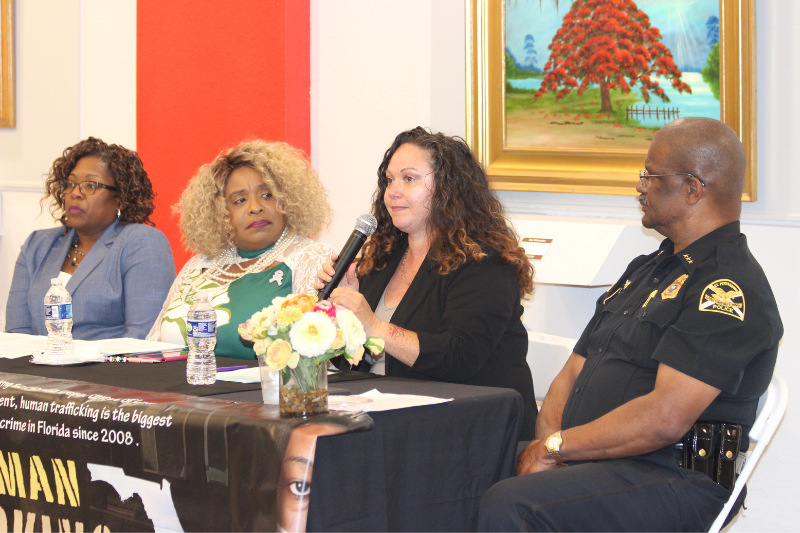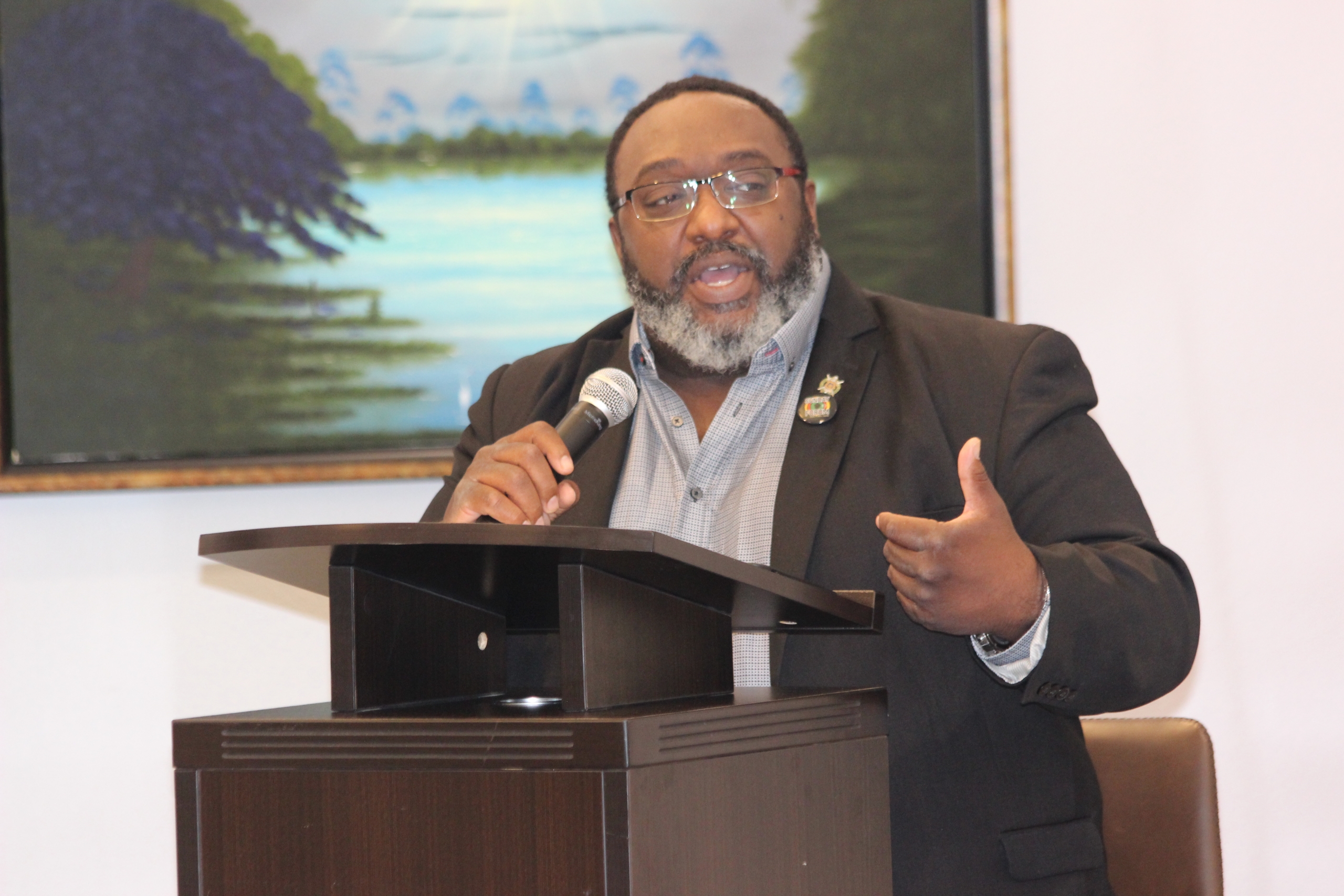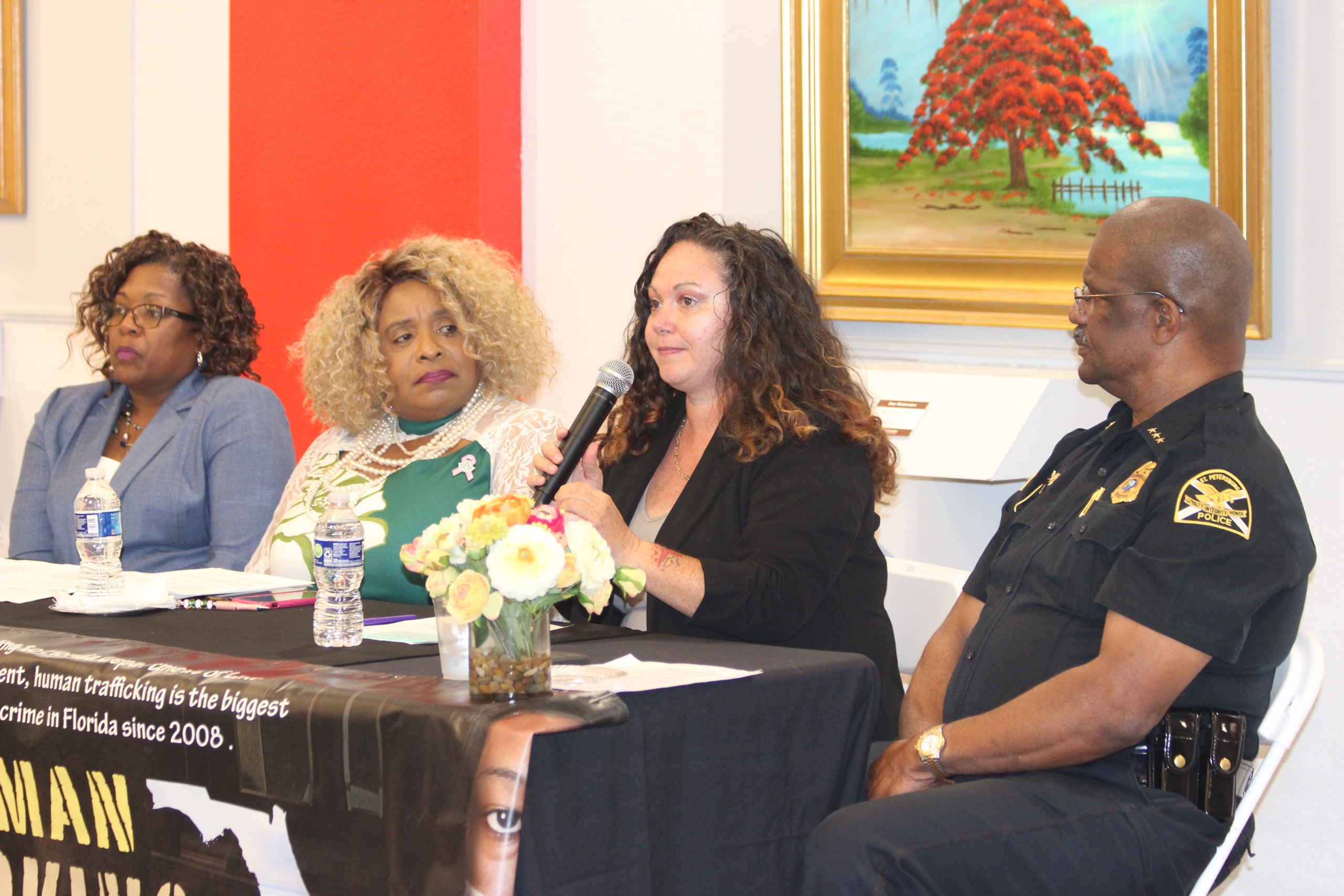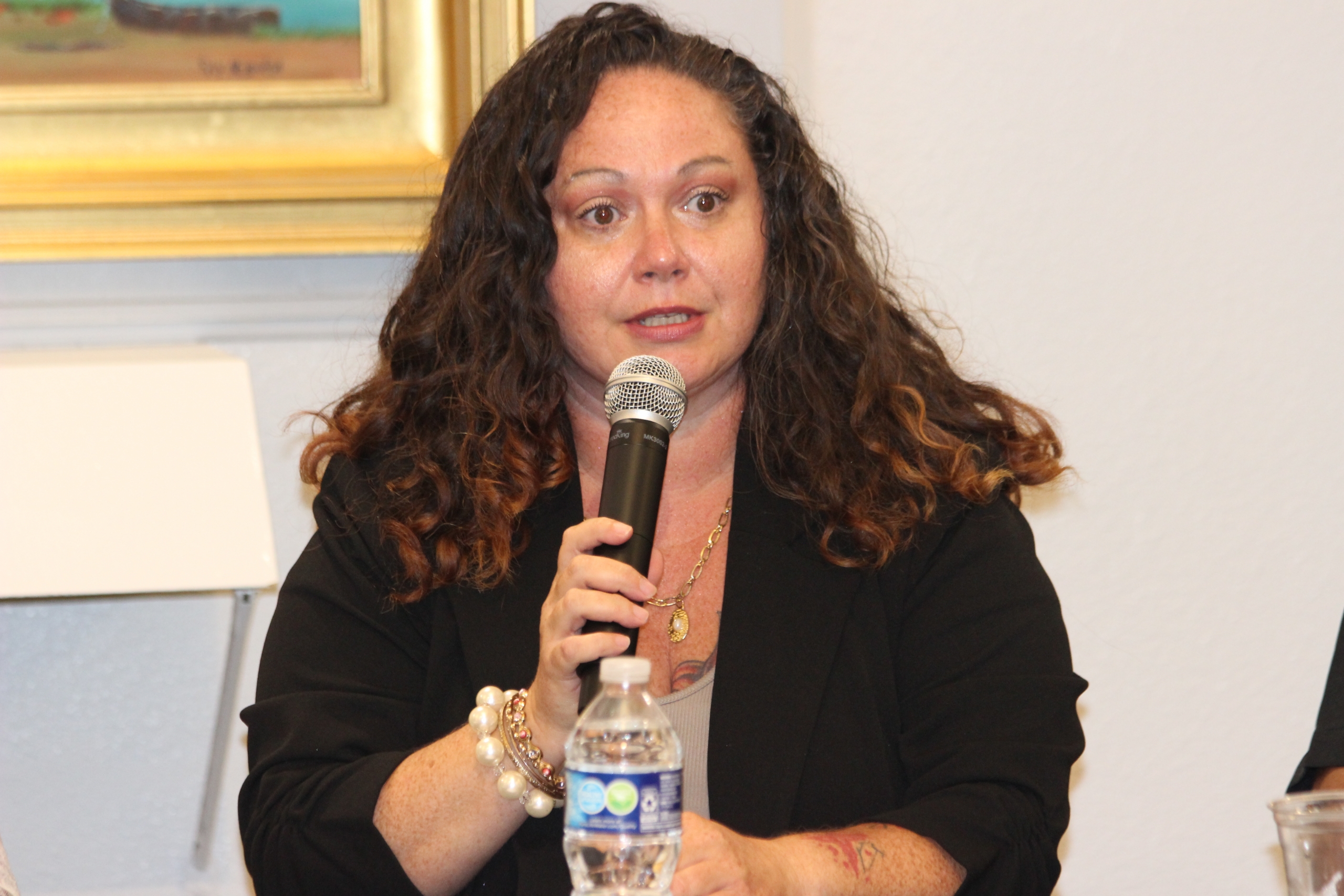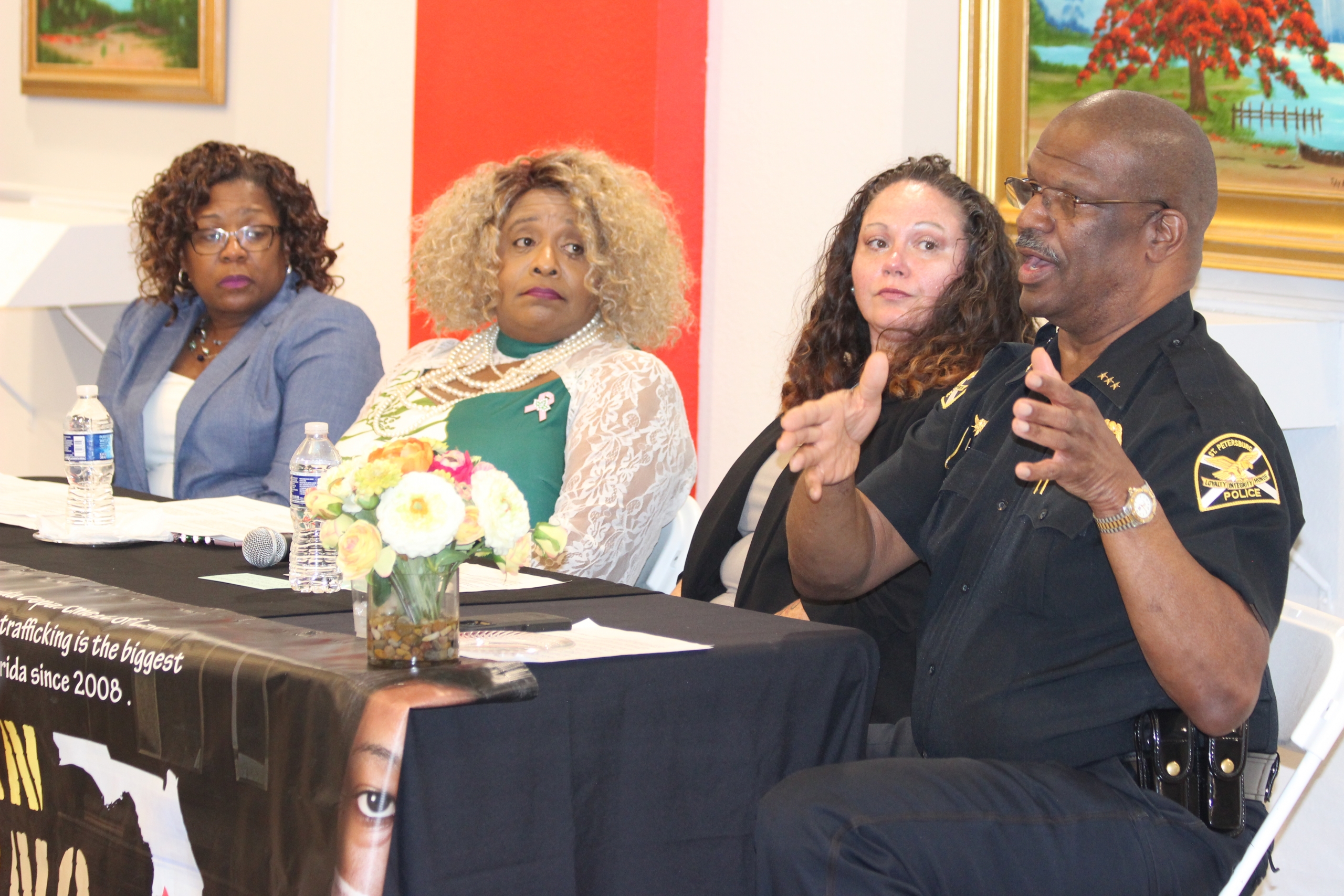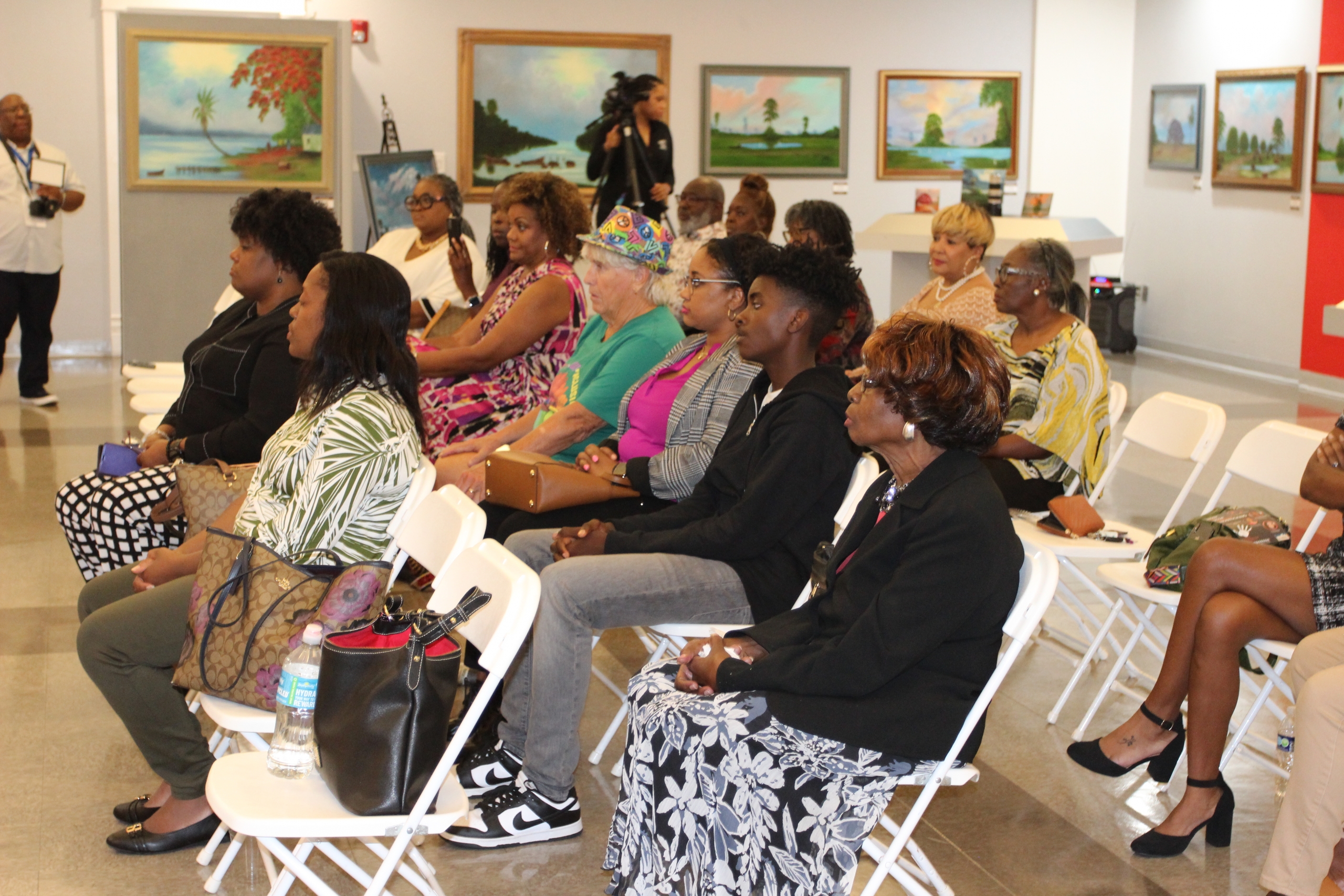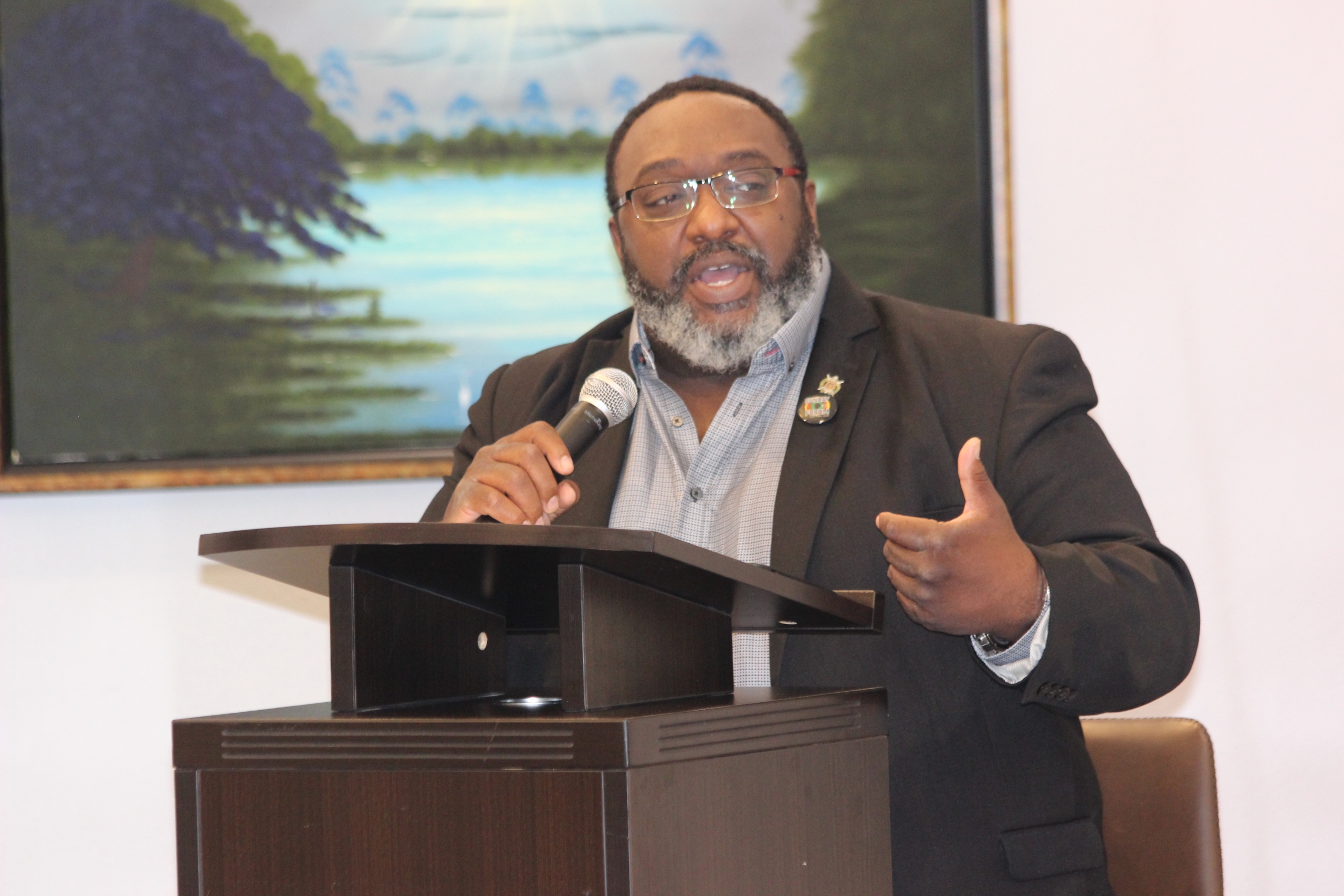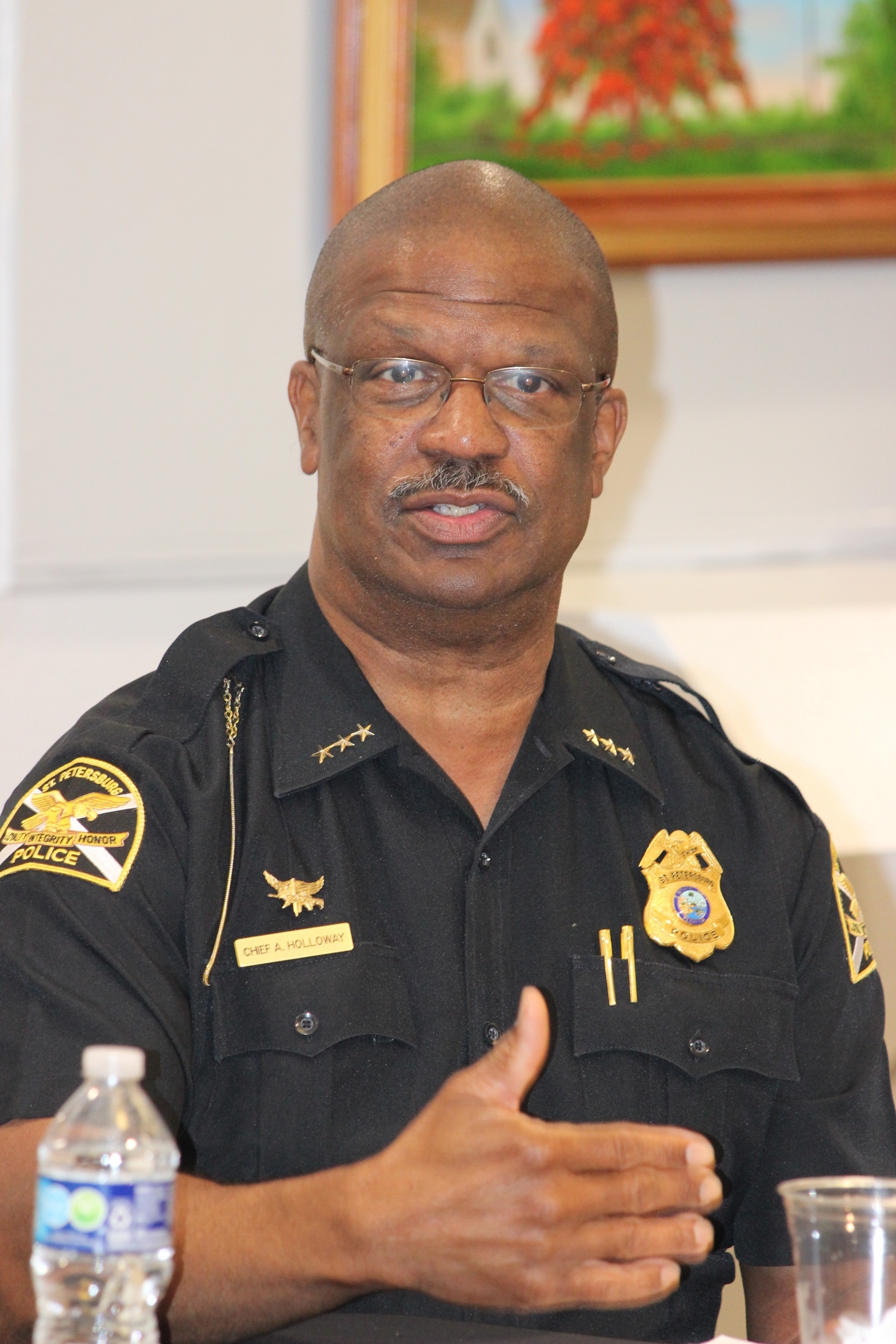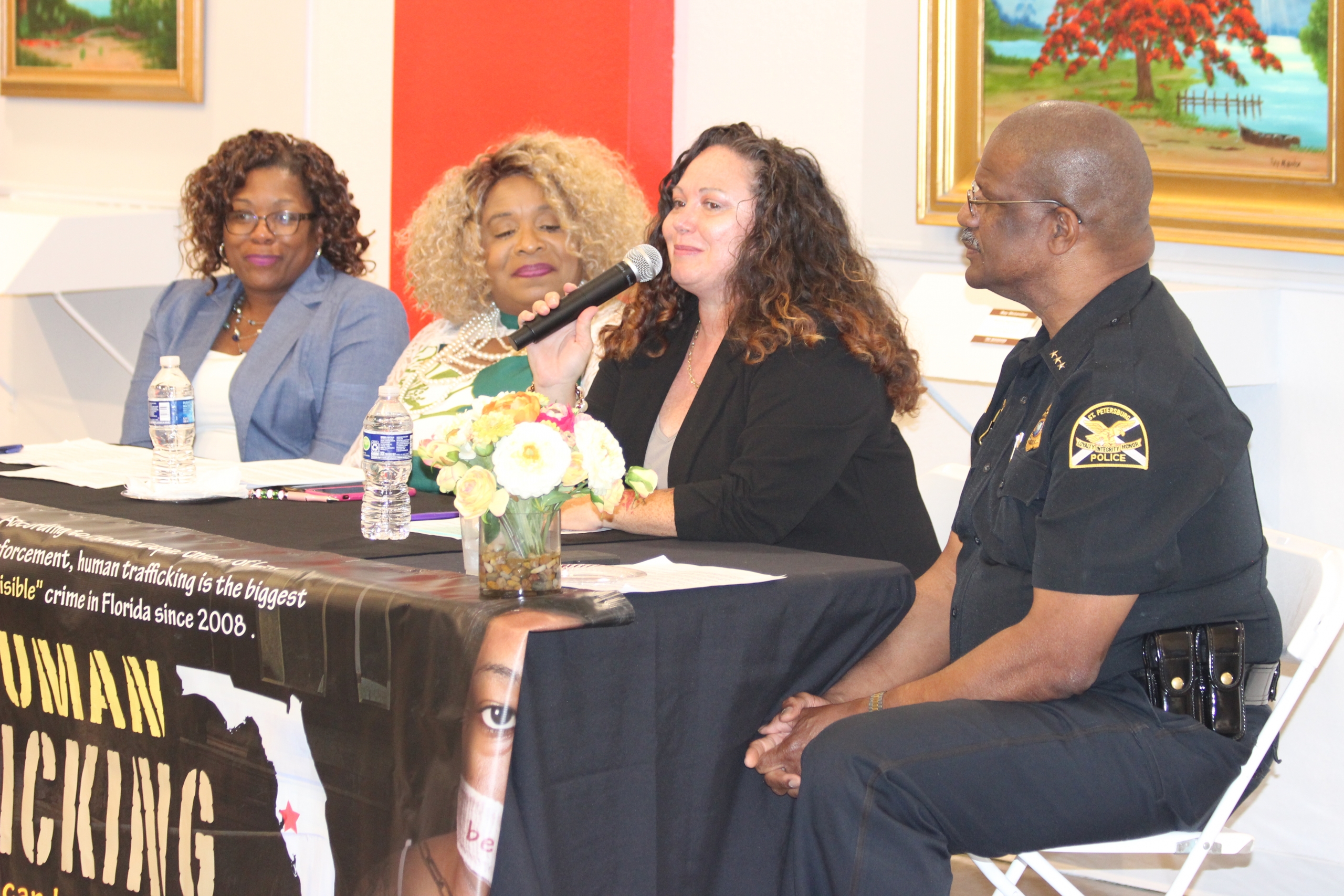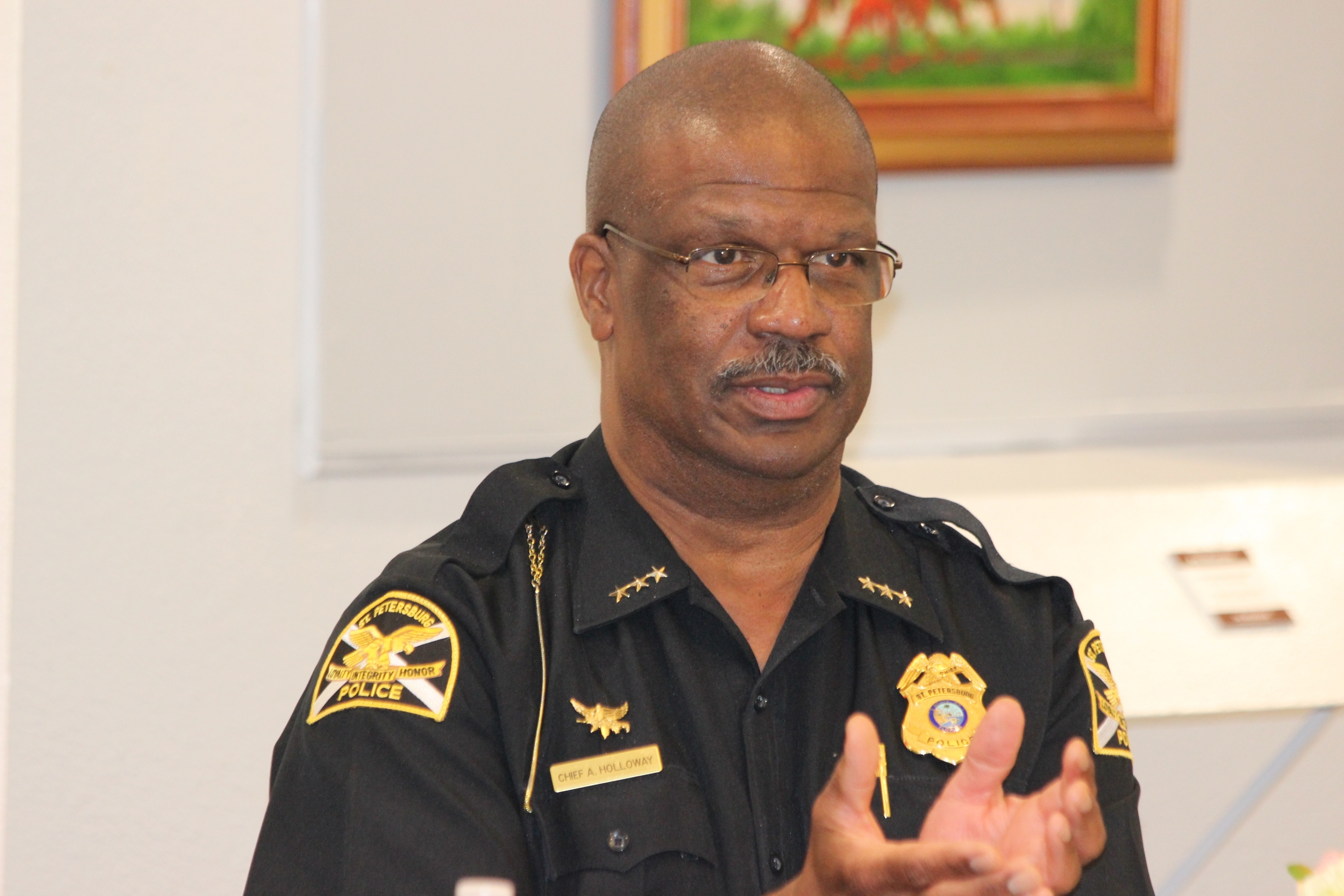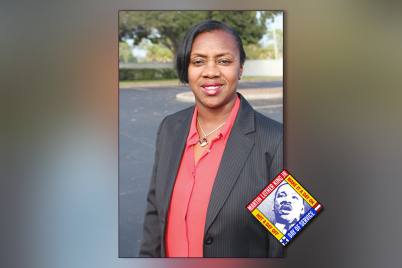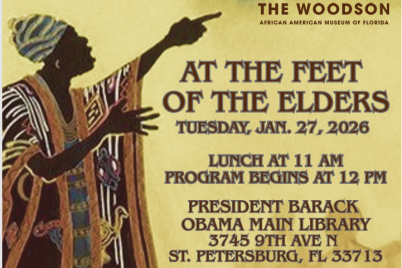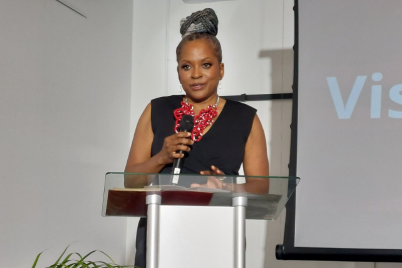Left, Michelle Walker, executive director of Miracles Outreach, Pinellas County Commissioner Rene Flowers, survivor and activist Telisia Espinosa and Police Chief Anthony Holloway
FRANK DROUZAS | Staff Writer
ST. PETERSBURG — Human trafficking affects communities far and wide, and local organizations and individuals are coming together to raise awareness and explore practical strategies for prevention and intervention. A panel of distinguished experts and advocates discussed this issue at The Woodson African American Museum of Florida on Oct. 12.
Survivor and activist Telisia Espinosa, a native of Miami, grew up in a dysfunctional household and was abused by three different men by the age of nine. Consequently, a father figure for her was based on sex, and she became promiscuous in her teen years, craving attention. As an adult, she worked at a strip club, where she met a man.
“Our eyes locked,” recalled Espinosa. “He was unlike any of the other men that have come into the club before. Very well dressed, smooth, good looking.”

Survivor and activist Telisia Espinosa’s mother was a drug addict, her father was an alcoholic, and she was abused by three different men by the age of 9.
The man asked Espinosa to sit with him, and one night of conversation led to many more. Soon, he took her to lunch and dinner and drove her to and from work. Unlike all her teenage relationships, this one was not based on sex for Espinosa. Instead, the man wanted to know all about her, including her dreams and aspirations.
After months of seeing each other, he asked if she would like to travel with him to see his family. Espinosa agreed to go to Cleveland with him, but upon reaching their destination, things completely changed, she recalled.
“He told me exactly what I needed to do in the van that we had traveled in, put me outside of the van, and told me to go make money for him,” she said. “So, it went from him being ‘boyfriend’ to ‘now this is what you’re going to do.’ So, that night, I did exactly what he said to do, and I came in that morning, and his response to me was, ‘Let me get that money you just made,’ and the next words that he said to me literally melted my heart when he said: ‘I’m proud of you because you’re the only girl that did everything I told her to do.'”
Espinosa had never heard a man tell her he was proud of her and was now willing to stay with him and do whatever he asked. This led to her “being sold on street corners, all over the U.S.” She not only had to deal with his wrath, Espinosa said, but sometimes had to fend off attacks from violent strangers she would come across in her line of work.
She finally got out after four and a half years of this life. Espinosa became ill and suffered from severe panic attacks. It was even difficult for her to be around people.
“I ended up moving to Tampa, and my life has totally changed,” she said.

Police Chief Holloway said you can’t put a face to a trafficker. ‘They could be that doctor; they could be that police officer; they could be that teacher; they could be that clergyperson because I’ve seen them all get arrested.
St. Pete Police Chief Anthony Holloway noted there is a human trafficking task force here in Tampa Bay, and detectives find many cases daily. Females can be groomed at various ages, some as young as 14 and some as old as 55.
“Some of these human traffickers will take these young ladies, put them in high schools so they can recruit for them,” he said.
Holloway explained that trafficking can also operate on a “trading system,” where, for example, someone in Tampa can send five girls down to Miami, and the trafficker down there can reciprocate by sending five to Tampa.
“Every day, the detectives are out there looking because there is a victim out there,” he said. “He or she doesn’t even know that they’re victims yet because they’ve been groomed.”
As to what role a community can play in helping to prevent human trafficking, Pinellas County Commission Rene Flowers said that “we just should go back to being as nosy as we possibly can in our children’s lives.”
“If you see someone hanging around your community,” she said, “you don’t know them, they don’t live there, and they always have this smooth conversation for the kids—the question then becomes, ‘Why are you here? Who are you?'”
People hanging around sporting events like football or basketball games who are waiting for young people to exit and ask, “Where the party is?” can be suspicious, Flowers said.
“They use other children to recruit children,” she said.
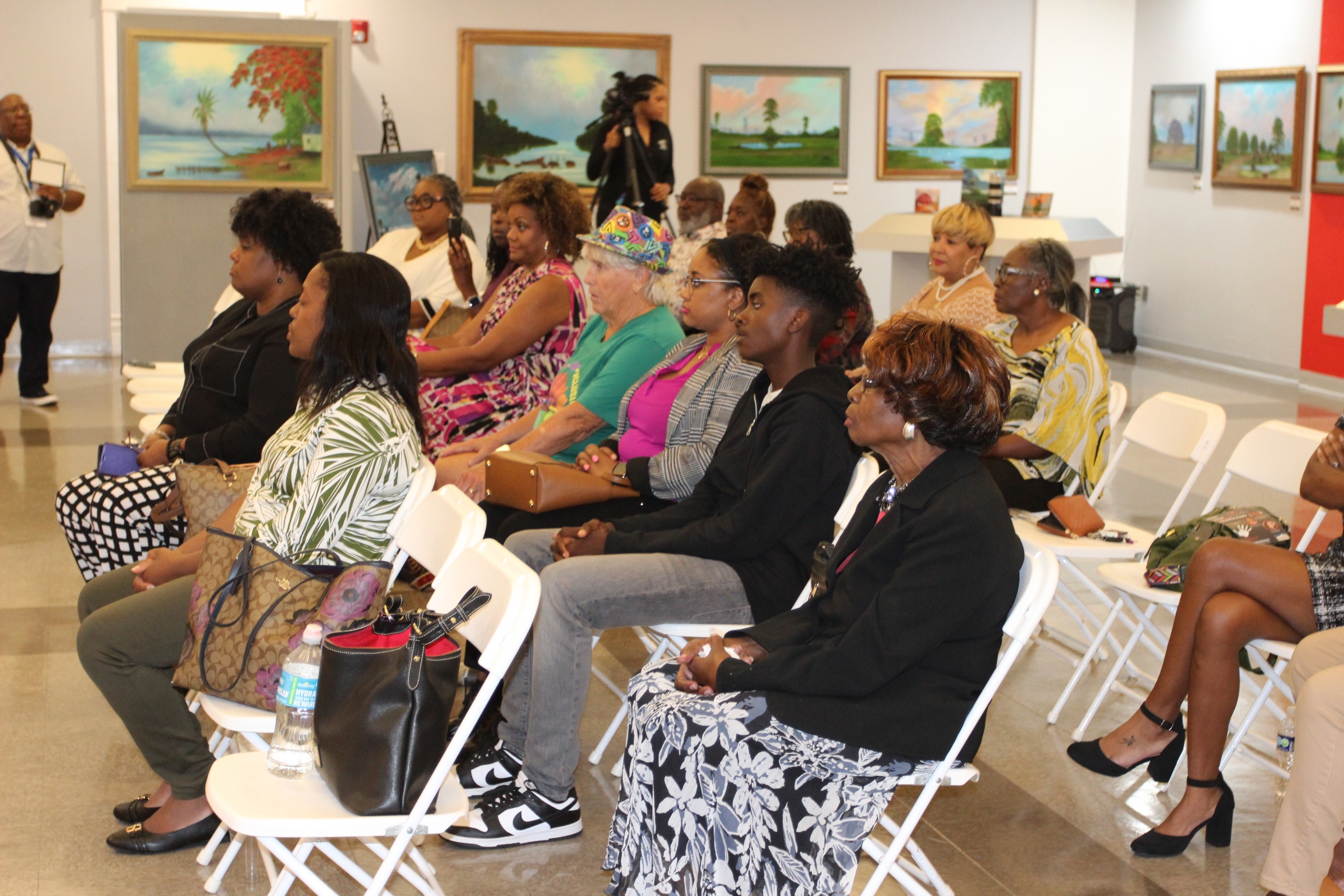
According to the Florida Alliance to End Human Trafficking, Florida ranks as the third highest state for human trafficking cases and second for labor trafficking cases.
She urged vigilance for parents, even when it comes to knowing in what social media sites their children are active.
Michelle Walker, executive director of Miracles Outreach, who works with survivors through her organization, said that establishing trust can be a huge barrier, as victims tend to lose the ability to trust others after their experiences with trafficking.
She said re-establishing trust is the first step, as “you can’t get anything done until you establish that rapport and build that trust.” Espinosa agreed that victims of trafficking have difficulty trusting anyone, especially law enforcement.
“We are taught that they are our sworn enemy, and we are theirs,” she said, adding that she now truly appreciates law enforcement.
Holloway said it is easy for an officer to view a prostitute as someone who is breaking the law and should be arrested, yet it is vital to ask how this person came to be in this situation and try to get that person some help.
People from all walks of life can be traffickers, as the chief pointed out a married man in the area with children in a private school who had operated a trafficking ring. Professionals of all kinds — teachers, judges, clergy members, and business people, for example, have been involved in such circles.
“You’ve got guys that will schedule their vacations to bring their families down here to meet with kids,” he said.
Flowers noted that it is not just young girls but young boys being trafficked. She said it is crucial to look for signs and signals in behavioral changes in young people, like an A and B student suddenly becoming uninterested in school or an outgoing child becoming unexplainedly sullen.
She also praised the community policing efforts of the SPPD, which encourages people to talk to officers and point out any suspicious individuals that might be hanging around parks and other places where kids gather.
Espinosa added that other signs to look for are how young people act or what they purchase in stores. For example, a group of young girls buying multiple boxes of condoms can be an indicator. Another sign is branding, such as a group of girls having the same tattoo in the same exact place.
Parents should also look out for children coming home with expensive clothing, purses, phones and other items they did not buy. She cautioned that when it comes to luring young boys, the traffickers will use chat rooms in video games to engage with them.
Holloway said that people who encounter such suspicious behavior can call the police non-emergency number or submit an anonymous text to 847411 (tip411).
Undocumented migrant children are at risk of being trafficked, too. Espinosa noted that since Florida’s weather is generally mild, it attracts traffickers who look to keep their victims working year-round. Young people are not being kidnapped for the sake of being kidnapped, Walker pointed out.
“When you think about the number of children being kidnapped,” she said, “they’re not, like, dissipating in the sky. They are being kidnapped and being placed into certain situations; some even sent overseas because you do have some countries where it is legal to sell your children for a debt that you owe.”
There is a distinction, Holloway noted, between a sex offender and a trafficker. A trafficker is making money while a sex offender has committed a sex crime, he said, adding that he has never seen a sex offender in the human trafficking business.
Sometimes trafficking starts in the household, Flowers said, even in a seemingly religious one. Some women realize that their husbands or boyfriends are trafficking them out of the house but are too worried about what people will say about them to speak out.
And in some cases, young people can speak out but are dismissed as “making stuff up.” Some mothers who are survivors even say to their kids, “It happened to me, and you’ll get over it.”
Vulnerable people, Espinosa said, whether it is emotionally or financially, can be more susceptible to traffickers.
“It doesn’t matter how old you are, it doesn’t matter what color you are, it doesn’t matter what nation you come from, trafficking is because of vulnerabilities or a person that someone takes advantage of,” she said, noting that older victims are many times in financial straights when they get pulled into the life.
For more information, visit MiraclesOutreach.org.

